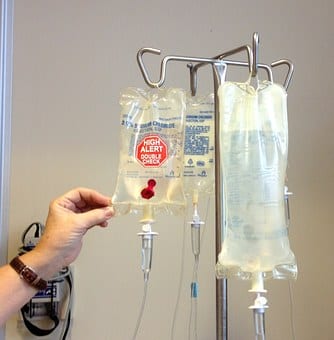Do you remember when the person you care for was first diagnosed with MS? You might not have been around them at the time, but I remember it very well. Those were very confusing days. I was almost sure Lynn had MS. He didn’t want to talk about it or give the disease any power over him so he refused to acknowledge he “had” it. He would not read about it, he would not look anything up, he didn’t want to talk about it. As I’ve mentioned before, he feels that if you give what you have a name, then it tries to take over your life. If you refuse to allow it to “have” you, then you still have some control. To me, that was burying his head in the sand. I’m just the opposite. I think the more you know, the better prepared you can be; so, I started looking up as much as I could “in secret” so I could know what to expect.
I was expecting for Lynn’s first neurological appointment after being diagnosed to be an extensive information session. I figured we would be told what to expect, treatment options, ways to improve his chances of staying healthy, …all kinds of things. But that didn’t happen. The doctor came in and took a medical history. Then he did an examination. Then he said something about relapsing remitting MS, handed us several booklets on various medications, gave us a handout on a MS study he thought might be a good option for Lynn, and asked if we had any questions???????
Questions? I had about a million but Lynn had none. I told myself, “this is his disease and his life. Let him handle it like he feels he needs to.” So I didn’t ask any questions but instead went home and read the pamphlets and started checking out information on the National MS Society website. I got an overall understanding of what MS was and some of the treatments, but it was really overwhelming. There were so many different types and so many different symptoms. I didn’t know what I needed to know. Where should I start and what was essential and what was good to know or what might not ever be needed? That’s when it would have really been nice to know someone who had MS who could have put it all in perspective but although almost everyone we talked to “knew” someone with MS, we didn’t know anyone and we didn’t want to call a stranger to talk. I was fortunate that shortly after Lynn’s diagnosis, two people I worked with told me their mothers had MS. That at least gave me someone to question about what was happening.
But you know what I think would have REALLY helped? It would have really helped if our doctor had decided to treat the person who had MS instead of the symptoms the person had. I don’t mean to imply that our doctor didn’t do a good job of treating Lynn; he did. He’s very knowledgeable, he will answer any questions we have, he’s well-respected by his colleagues for his expertise, but unless I asked specifically for some type of referral or information, it wasn’t provided.
I’ve heard about places that have MS Centers. I think that would be wonderful. I think that when someone gets diagnosed with MS, they should have a complete physical workup to determine all the potential organs and functions that might be affected. They need a counselor to discuss their fears, concerns, grief, anger, whatever they’re feeling… and so does their family, both separately and together. They need to be started on an exercise plan specific to whatever areas of weakness may be present and their caregivers taught how to assist correctly. There should be a dietician to talk about healthy diets FOR MS PATIENTS; not cardiac healthy eating but what foods are being found to support neuron function. An appointment with a social worker to talk about planning ahead for applying for Medicare or Medicaid and what resources are in the area to help people with MS. A pharmacist to talk about the abundance of prescriptions that might help or hinder the symptoms of MS specific to person. Then wouldn’t it be awesome to have someone to pull it all together and talk about what to expect, handy hints for everyday living, how to handle (fill in the blank)?
Why can’t a well-rounded approach be used to treat someone with a chronic condition that affects every aspect of their lives and potentially every organ of their body? When will the medical progression get smart and realize, we don’t know what we don’t know so TELL US! Is that too much to ask?
4 thoughts on “I Don't Know What I Don't Know”
Comments are closed.




Ha. All my husband said was “how long will it take to kill me?” When the Dr. told him it wasn’t “Fatal” he said “ok” and that was all he wanted to know! OMG! Dr. has always been supportive, and when we have researched and found “off the beaten path” treatments we wanted to try (low-dose naltrexone) he has done his own research if needed and supported (the LDN prescription) or explained why not. But he doesn’t do much else. I guess when your MS moves from RRMS to SPMS….
Well, we did do the round of plasmapheresis last summer. That was when I asked his Dr. isn’t there ANYTHING we can try to stall this horrific progression????
I agree that an integrative approach needs to be the norm for this and all disease. I do go to an MS Center affiliated with a very well known big city hospital but even that isn’t enough. Integrative Medicine is hopefully on the rise. There is more to illness than just the science. I’m beginning to see the mind, body and spirit connection in who does well and who doesn’t. We need to demand the change of attitude. I personally am not going to go down without exploring all my avenues.
I think they don’t tell us much because they don’t want to scare us… Me and my husband are like you, we want to know Everything, and it’s hard to get information.
I’m getting used to know it just after I need it…
All the best for you and Lynn, and please carry on with this great blog. It’s where I find more usefull information about what to expect in the near future, or hopefuly not so near…
“and started checking out information on the National MS Society website” … Patti, my wife, was diagnosed pre-Internet and only one pamphlet from neurologist’s office in those days we had to go to the public library and search through bound volumes of the New England Journal of Medicine for additional information. We didn’t even know what questions to ask!
Caregivingly Yours, Patrick